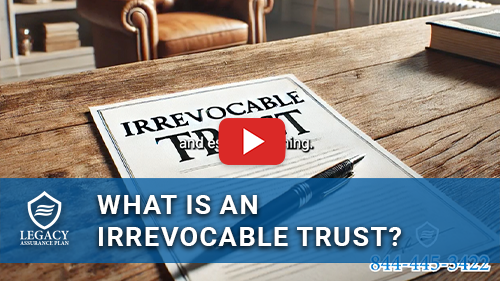An irrevocable trust is a trust that the grantor is unable to either amend or revoke after it's signed. The grantor is usually not the trustee. They are most often used for asset protection, Medicaid eligibility, Medicaid estate recovery avoidance and estate tax reduction. They are intended to preserve assets for the benefit and use of the grantor's family in the future or protect them from creditors, divorce and other claims.
What types of assets are typically transferred to an irrevocable trust?
Irrevocable trusts are usually funded with appreciating assets, like real estate. Typical examples of assets placed into them are the grantor's residence, family farms, vacation homes and lake cabins. They cannot be amended, so they cannot be revised in response to future life events. As a result, care must be taken in deciding what assets are funded into them since the assets will not be available to cover the grantor's living expenses.
What are the common purposes of an irrevocable trust?
Irrevocable trusts are typically used for:
- Asset protection (claims from the grantor's and beneficiaries' creditors)
- Keeping property in the direct family (divorce protection)
- Preserving assets from spendthrift beneficiaries
- Medicaid preneed eligibility planning
- Estate tax reduction
Irrevocable trusts and asset protection
Irrevocable trusts are used to protect assets from creditors of both the grantor and the beneficiaries to preserve them for future use. The assets in a revocable trust are subject to the debts and obligations of the grantor's creditors. Any debt owed by a grantor individually can be satisfied from assets owned by his revocable trust. The assets funded into an irrevocable trust, however, are insulated from most personal liabilities against grantors. The grantor's personal creditors cannot collect the debt from the trust's assets. Irrevocable trusts also protect assets from the creditors of beneficiaries. The beneficiaries don't own the assets or control the trust, so trust assets cannot be attached to satisfy their creditors.
Irrevocable trusts and Medicaid
If the grantor is concerned about the cost of long-term care and believes that Medicaid eligibility may be an issue in the future, that possibility needs to be considered when creating an irrevocable trust. Irrevocable trusts can be used as part of pre-planning for Medicaid eligibility to preserve an asset for which no other spend-down exemption is available, such as a vacation home or farmland. Assets funded into an irrevocable trust are only protected from Medicaid spend down more than five years after they are funded into the trust.







